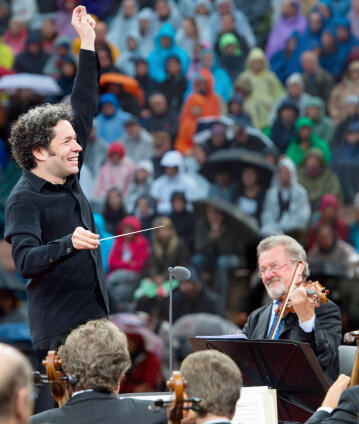Gustavo Dudamel conducts Wagner and Schumann at the Waldbühne

The orchestral music from Wagner’s Ring des Nibelungen is ideal for a concert at Berlin’s Waldbühne. Particularly with such a dynamic conductor as Gustavo Dudamel, pieces like the Ride of the Valkyries develop an impact that reaches even the very last rows of the enormous auditorium. Like Wagner’s opera cycle, Robert Schumann’s Third Symphony leads us to the Rhine, inspiring the composer to vibrating and sonorous music.
“When I hear Wagner’s music, I always think of the sunrise from Nietzsche’s Zarathustra – the crescendo of colours, the epic naturalism, the illumination of a huge spirit. It sweeps you away, like great cinema,” avows Gustavo Dudamel. This is not the first time he guest conducted at this event. Already in 2008, the Venezuelan conducted the Berlin Philharmonic’s traditional conclusion to the season, debuting with the orchestra at the same time. The concert of Spanish and Latin American music was entitled Los ritmos de la noche, and delighted not only the audience but also the press. The event may well go down – the critic from the Tagespiegel wrote – as the coolest conducting debut in the history of the Philharmoniker. A further appearance at the open-air theatre with works by Tchaikovsky and Brahms followed in 2014.
For his third concert at the Waldbühne, the conductor is favouring exclusively German romantic music, works by two composers who are almost exactly the same age and are both from Saxony, but in personality and musical conception could not be more contrary: Robert Schumann and Richard Wagner. The two knew and respected each other. “I very much liked Wagner, but he talks incessantly,” Robert Schumann is supposed to have remarked after their first meeting, while Wagner deemed: “A great person, this Schumann, but he hardly opens his mouth.” Each was progressive in his own way. Robert Schumann’s five-movement Symphony No. 3, which he composed after moving to Düsseldorf along the Rhine in 1850, ostensibly adopts folksy and optimistic tones, but below its carefree surface it is simmering. The fourth movement illustrates this with ceremonial contrapuntal rigour, enabling one to look into dark abysses within the soul.
When Schumann composed his symphony, Richard Wagner’s plans for the monumental tetralogy Der Ring des Nibelungen with the prelude Rheingold and the three full-length operas Walküre, Siegfried and Götterdämmerung, from which orchestra pieces can be heard at this concert, were still at a very early stage. Against the backdrop of a mythical realm of legends, the composer tries to come to terms with the dark sides of human existence: murder, incest and the well-nigh insatiable appetite for power, in the face of pure love as an alternative. The music reflects, comments on and illuminates the protagonists’ emotional sensations with a range of musical timbres. “The scores are so well written,” Dudamel raves, “so brilliantly conceived, the orchestration is amazing, the harmonies so full of expression. Every note means something – sometimes many things at once.”
© 2017 EuroArts Music International
Category
Artists
Our recommendations
- Gustavo Dudamel conducts Tchaikovsky and Brahms at the Waldbühne
- A “Night of Love” with Ion Marin and Renée Fleming at the Waldbühne
- Simon Rattle conducts film scores at the Waldbühne
- “Rhythm and Dance” with Kent Nagano and Susan Graham at the Waldbühne
- Simon Rattle conducts Beethoven and Mendelssohn at the Waldbühne
- Simon Rattle and Magdalena Kožená at the Waldbühne